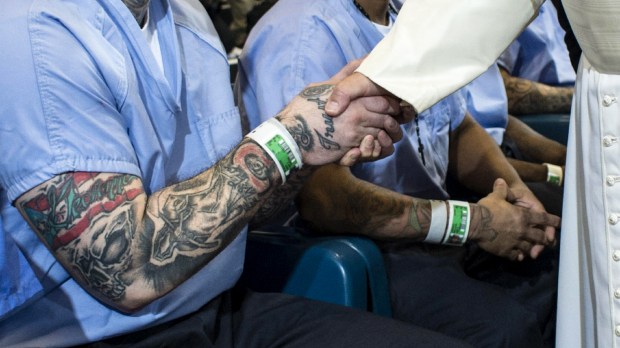Pope Francis is calling for an update to the Catechism regarding the death penalty, saying that since the Word of God is “always alive,” a rigid reading of doctrine would “undervalue the action of the Holy Spirit.” Thus, he says, in the light of the awareness of the people of God today, capital punishment can be seen as “intrinsically contrary to the Gospel.”
The Catechism currently states (2267):
the traditional teaching of the Church does not exclude recourse to the death penalty, if this is the only possible way of effectively defending human lives against the unjust aggressor.
The pope made his call for a change today at the end of a colloquium organized by the Pontifical Council for Promoting New Evangelization, to mark today’s 25th anniversary of the publication of the Catechism of the Catholic Church (CCC).
The Holy Father spoke against the death penalty in the strongest terms: “an inhumane measure that humiliates … human dignity”; “an extreme and inhumane solution”; “intrinsically contrary to the Gospel”; “inadmissible because it is an attack on the inviolability of the human person…”
The Bishop of Rome said the death penalty must be rejected because it suppresses “a human life, which is still sacred in the eyes of the Creator.”
In addition, it prevents the possibility of “moral and existential redemption,” he noted. In this way, capital punishment “forgets the primacy of mercy over justice.”
Demanding that it be prohibited is not a contradiction with the past teaching of the Church, the pope emphasized, because the dignity of the human person from conception until natural death has always been taught by the Magisterium.
Pope Francis’ teaching is in line with opposition to the sentence expressed by his predecessors.
The Catechism has in fact already evolved on the question.
In 1992, paragraph 2266 of the CCC declared that the authorities of a country must protect the common good using proportionate means, “not excluding, in cases of extreme gravity, the death penalty.” Then, subsequent editions of the CCC specified that the “cases of absolute necessity” justifying capital punishment “are very rare, if not practically nonexistent.”
This position was also clearly expressed in YouCat, the edition of the catechism designed for young people, published in 2011. Question 381 reads, “Why is the Church opposed to capital punishment?”
On December 12, 1999, John Paul II made an appeal to all those in authority, “that they reach a consensus on the abolition of capital punishment.” It is a “cruel and unnecessary” punishment, he had explained earlier, on January 27, 1999.
In 2011, Benedict XVI also called for consultation among all authorities to “arrive at the elimination of the death penalty.”
Before today’s speech, Francis had already taken a firm position against the death penalty on several occasions.
For example, in a video message on June 21, 2016, he stated that capital punishment is “unacceptable,” adding that it “doesn’t provide justice for the victims, but rather encourages revenge.”
“The commandment ‘You shall not kill’ has absolute value, and includes both the innocent and the guilty,” he explained.
Since its first publication in 1992, the CCC has been translated into 48 languages, said Archbishop Rino Fisichella, president of the Pontifical Council for Promoting New Evangelization. Its promulgation on October 11, 1992, took place 30 years to the day after the opening of the Second Vatican Council.
Since the Council of Trent, Church Councils have traditionally been followed by the publication of a catechism. In the case of Vatican II, the publication of the catechism did not take place until the pontificate of John Paul II. XLN

